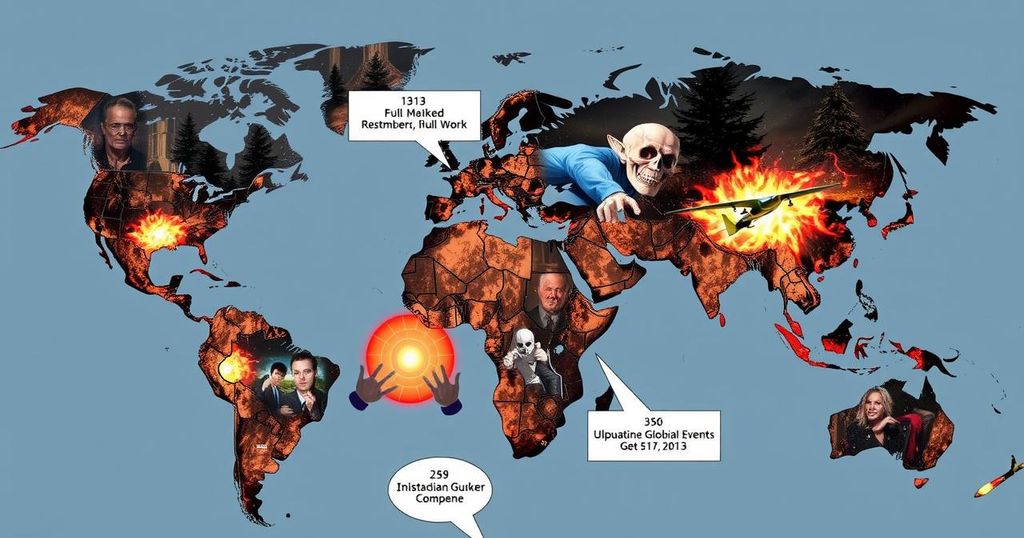Year End Review 2024: A Year of Tragedies and Human Resilience

The year 2024 witnessed numerous tragic events, including devastating natural disasters like earthquakes, landslides, hurricanes, and human-related tragedies encompassing shootings, conflict-related deaths, and severe weather impacts. Significant incidents included the Noto earthquake in Japan, Hurricane Helene, and a shooting in Moscow causing mass casualties. The year underscored the pressing need for disaster preparedness and effective governance as communities grappled with these challenges.
The year 2024 was marked by an array of tragic events that left profound effects on various communities around the globe. This year saw numerous devastating natural disasters and human-initiated catastrophes that highlighted both the vulnerability of regions to natural occurrences and the impact of human actions on societal stability. The significant loss of life and destruction of infrastructure during these events necessitated urgent discussions on disaster preparedness and the need for effective governance.
Natural disasters dominated the headlines, beginning with a grave earthquake on January 1 in Japan’s Noto Peninsula, resulting in substantial infrastructure damage and the loss of over 280 lives. Following this, catastrophic landslides in Ethiopia and Kerala claimed hundreds more lives, prompting concerns over environmental degradation and inadequate disaster response mechanisms. The Atlantic hurricane season witnessed Hurricane Helene causing 235 deaths, while Cyclone Chido and Typhoon Yagi further exemplified the increasingly perilous nature of extreme weather in vulnerable regions.
In addition to natural disasters, the year was marred by humanity’s darker side. A tragic shooting at a concert hall in Moscow killed 154 individuals, characterized as an act of terrorism by Russian authorities. Bangladesh faced serious political unrest leading to the fall of the government, with escalating protests resulting in approximately 650 fatalities. Severe weather events, including a record heatwave in Las Vegas and tragic deaths during the Hajj pilgrimage, underscored the relationship between climate change and human life.
The aviation industry also experienced a crisis, with multiple tragic incidents marking 2024 as one of the deadliest years in aviation history. Notable disasters include a plane collision at Haneda Airport and the crash of Flight 2283 in Brazil that resulted in no survivors. Moreover, the ongoing crises such as drought in Zambia and the protracted wars in Ukraine, Israel, and Sudan revealed the escalating toll of human conflict and environmental challenges.
The multiple facets of calamity across the year 2024 stress the urgent need for enhanced disaster preparedness and international cooperation to mitigate the effects of both natural and man-made tragedies. As societies navigate these challenges, proactive strategies and a focus on human welfare will be paramount in fostering resilience and recovery.
This year-end analysis explores the significant tragedies that occurred throughout 2024, a year characterized by severe natural disasters, violent human conflicts, and unforeseen accidents. Each event highlights the vulnerabilities experienced by communities worldwide and often underscores issues related to climate change, governance, and disaster preparedness. Furthermore, this overview aims to foster awareness of the interconnectedness of global crises and their implications for human societies, as well as the necessity for solidarity and resilience in the face of adversity.
In conclusion, the year 2024 has been a stark reminder of the fragility of life and infrastructure in the face of both natural disasters and human conflict. The death toll from these tragedies surpasses thousands, indicating an urgent need for improved disaster readiness and more robust governance structures worldwide. As societies strive to recover from these profound losses, the global community must prioritize sustainable practices and peaceful resolutions to avert future crises and enhance overall human security.
Original Source: www.business-standard.com








